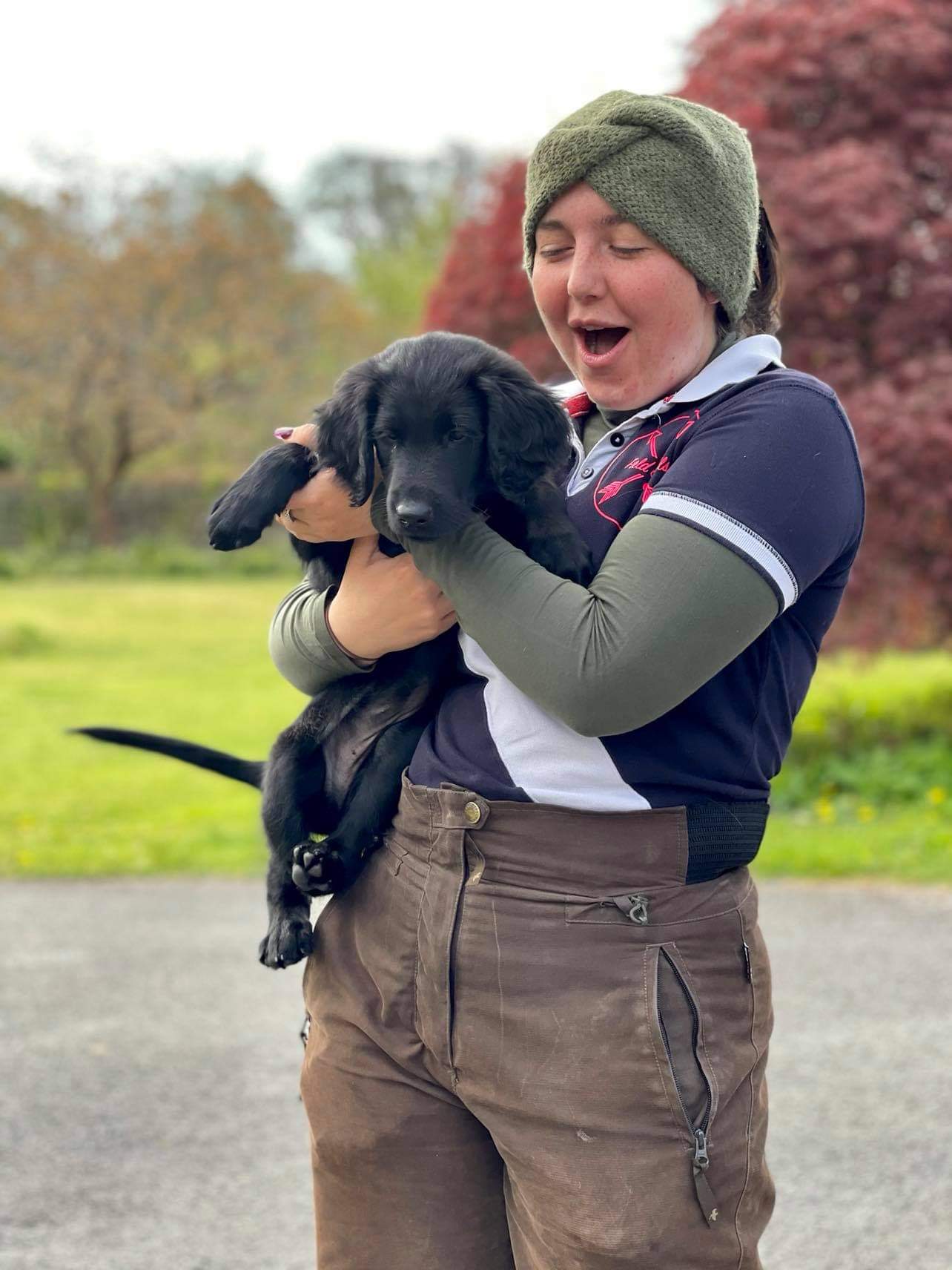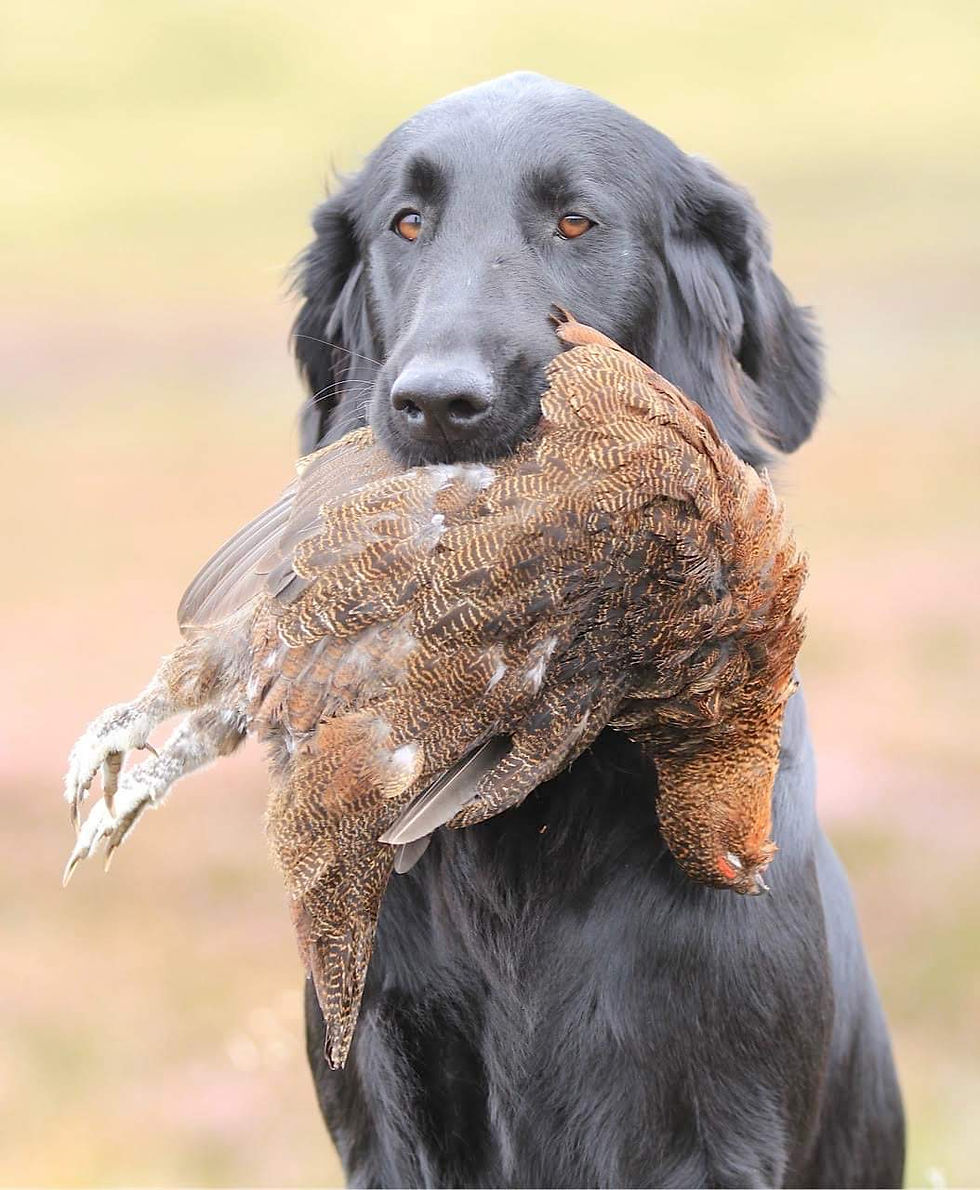Minority Gundog Breed Series Part 3
- Claudia Atkinson

- Aug 23, 2022
- 4 min read
Here we are again! With part 3 of the Minority Breeds Blog. This time, we’re looking into the Flatcoat Retriever. Currently, there’s a lot of debate around whether the Flatcoat is actually a minority breed at all, due to its growing numbers within the show ring, but in terms of working dogs, this stylish breed are still few and far between on the shooting field. We spoke with Caroline Hewison, long time Flatcoat owner, and she answered a few questions!
How long have you been involved with Flatcoats?
I got my first flatcoat in 1996, husband Chris had his first in 1986, we currently have five of them, and have owned 15 in total to date.

How have you seen the breed change over the years?
We have definitely seen the breed change over the years, possibly not so much in the field, but in the show ring, I think we do sometimes see less of the workmanlike balanced moderate dog that the flatcoat should be. I strongly believe the flatcoat should be a dual purpose breed and try very hard to think about that when we have a litter, or buy a puppy in.
It does seem that fewer people are working their dogs now - we do sometimes struggle to get a good entry at the working events, but it is hard to know how much of this is due to the effects of the pandemic and the cost of living. Show entry numbers seem to be increasing though, and there do seem to be many more people who show rather than work their dogs. I do try and do both, as I can't moan that working people don't show, and show people don't work, if I am not prepared to put myself out there! Although sometimes I feel I don't do either very well, and then other days it just works and we have great days too!
It's been very encouraging lately though that we have had a lot more new people trying their hand at working their dogs and they have enjoyed it, so hopefully they will carry on!
What’s the most common ‘is it a…/what’s it crossed with’?
More people now seem to recognise the breed when out and about, and I seem to get far less of the 'what is she/he crossed with?' than I used to!
Classic examples have been a 'black red setter' or a long haired Labrador or a black Golden Retriever! More people seem to recognise the breed since the two recent Crufts Best in Show winners with Jet in 2011 and Baxer in 2022.

What would your advice be to a fist time Flatcoat owner?
I would always advise first time flatcoat owners to do their research. Come along to working events, shows, training events and meet people, and meet the breed.
A good contact when looking for a puppy is to contact the litter recorders for the various flatcoat clubs, as they will know of litters from health tested parents from reputable breeders. We are lucky in that we have very few commercial flatcoat breeders, but it can be hard for those new to the breed to know about these, so speaking with the litter recorders is a very good idea.
A flatcoat isn't a suitable breed for everyone - they are loving, playful and love life. They can be in your face and lick a lot, so if someone is after a more aloof, independent breed, then a flatcoat isn't for them!
What are your breeds strengths and weaknesses?
They are a very versatile breed and seem to take well to multiple types of activity. Yes many people show, some will work in the field, many do agility and obedience, and even heel work to music. I think they definitely need an active lifestyle, they need training and structure, and can become mischievous and naughty if bored and not mentally stimulated. They are very loyal, have a super temperament and love to learn and to please you. Most are quite trainable and biddable. They definitely live life to the full.
They are excellent marking dogs, excellent air scenting dogs and so stylish while working. Some people who don't understand the breed do think they run around with their heads in the air, but they are usually working the wind and trying to pick up the scent!
We do have issues with cancer in the breed and some do die young of this, but there is a lot of work behind the scenes going on to try and understand why this is, and do something about it. Other than that they do seem to be a pretty healthy breed.

If you didn’t have Flatcoats, what breed would be your next choice and why?
If I didn't have a flatcoat, it would have to be a working Golden Retriever!
In regards to breeding, assuming that your gene pool is limited, what do you prioritise when looking for a stud dog?
When breeding a litter and finding a stud dog, I am looking for a variety of things - definitely health and temperament - I want good hip and elbow scores and clear eyes. I want a dog to work well and look good while doing it, so I want a stud dog to fit the breed standard, and have working ability, be trainable, be quiet while working and have a soft mouth. I will also look back in the pedigree and try and avoid those dogs where there are several that have died young of cancer, and try and research those lines that are long lived..If there are field trial awards, CC winners, Shooting Dog Certificate winners, and KCWGC and SGWC then so much the better!
We’d love to say a massive thank you to Caroline for sharing her knowledge of this long standing breed with us. As well as providing images of her dogs at work.
Keep an eye out, for our next blog, where we’ll be speaking with yet another #MinorityGundogBreed expert!
Fancy a Flatcoat?
0%Yes
0%Not yet!








Comments